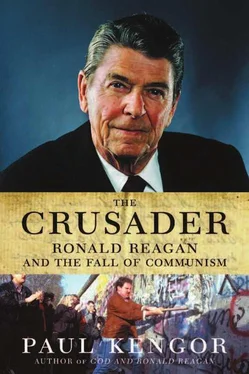A bill was introduced in Congress by Rep. William G. Stratton (R-IL) to permit entry of 400,000 DPs into the United States. 22Though a drop in the bucket, the Stratton bill was a lifeboat to hundreds of thousands. And yet, it faced stiff opposition—an opposition Reagan resolved to resist. 23Reagan agreed with U.N. official Herbert H. Lehman: “Apparently there are some people who would rather bury the Stratton bill in red tape and thus bury the DPs in a mass grave. They would be burying Protestants, Catholics, and Jews alike.” 24He also agreed with Earl Harrison, Commissioner of Immigration and Naturalization, who said that the DPs were fleeing totalitarianism and would become good Americans, “eager to support our government and institutions.” 25
On May 7, 1947, Reagan, through the New York-based Citizens Committee on Displaced Persons, released a statement urging passage of the Stratton bill. 26It was his first public campaign against Moscow, and for the first of many times to come, Reagan riled the Kremlin.
A few months later, on October 25, 1947, Reagan made a highly visible overture to the anti-Communist cause in testimony before the Congressional House Un-American Activities Committee (HUAC). He and a number of actors and producers were called as friendly witnesses to testify about Communist infiltration in the motion-picture industry.
While this period is today portrayed as a frightening example of Redunder-every-bed paranoia by grandstanding McCarthyites in the U.S. Congress, that caricature ignores the very real penetration that had taken place by Hollywood Communists. Only a year before the HUAC hearings, Communist screenwriter Dalton Trumbo had written that “every screenwriter worth his salt wages the battle in his own way—a kind of literary guerrilla warfare.” The Hollywood enforcer for that warfare was an unpleasant individual named John Howard Lawson, a screenwriter known as Hollywood’s “commissar.” Lawson gave total subservience to the Marxist motherland. Befitting Moscow’s representative in Tinsel Town, the Leninist Lawson also despised religion, desiring an orchestrated “campaign against religion, where the minister will be shown as the tool of his richest parishioner.” In his aptly titled book Film in the Battle of Ideas (published by the Communist house Masses & Mainstream), Lawson provided this advice to his comrades: “As a writer do not try to write an entire Communist picture, [but] try to get five minutes of Communist doctrine, five minutes of the party line in every script that you write.” Comrade Lawson also issued marching orders to fellow travelers among the acting class: “It is your duty to further the class struggle by your performance.” 27
Reagan was not exactly sympathetic to Lawson’s edict, and neither was HUAC, which, despite its ruthless reputation, was slow to the dance. It was not until late 1947 that Congress began to take seriously the repercussions of the surreptitious advice of the likes of Lawson. Hollywood Communists wanted to use the film industry to spread their ideas. Congress decided it should have a dog in that fight—and a dogfight it became. 28
By October 1947, Reagan’s film career was ten years old. He had made dozens of movies and had been elected president of SAG at a very young age. His youth was not lost on Newsweek, which, in a story on the hearings, said the pink-cheeked and sandy-haired Reagan looked so boyish that when he stood to speak the room was filled with “oh’s and ah’s,” mainly from the contingent of star-struck girls who came to ogle him, Robert Taylor, Gary Cooper, Robert Montgomery, and some of the other leading men. 29
By all accounts, from the left and the right, Reagan’s testimony was much more mature than his looks. Indeed, it is ironic that a man known for raining hellfire upon “evil” Communists gave a decidedly sober, cautious statement, particularly in contrast to the scathing denunciation provided by fellow actor Adolphe Menjou.
Reagan was first questioned by Robert E. Stripling, HUAC’s chief investigator, and then by chairman J. Parnell Thomas. Other committee members declined to pose questions, including Cold Warrior Richard M. Nixon. (Only a crazy person watching that hearing on that October 25, 1947 would have predicted that the two people sitting in the room who would later become president were Nixon and Reagan.) In his best moment, when his questioners allowed him a substantive, lengthy response, Reagan struck a reasonable balance between desiring to battle Communists and respecting a free, democratic society. Speaking of Hollywood Communists, he lectured:
[W]e have exposed their lies when we came across them, we have opposed their propaganda, and I can certainly testify that in the case of the Screen Actors Guild we have been eminently successful in preventing them from, with their usual tactics, trying to run a majority of an organization with a well organized minority.
So that fundamentally I would say in opposing those people that the best thing to do is to make democracy work. In the Screen Actors Guild we make it work by insuring everyone a vote and by keeping everyone informed. I believe that, as Thomas Jefferson put it, if all the American people know all of the facts they will never make a mistake.
Whether the [Communist] party should be outlawed, I agree with the gentlemen that preceded me that that is a matter for the Government to decide. As a citizen I would hesitate, or not like, to see any political party outlawed on the basis of its political ideology. We have spent 170 years in this country on the basis that democracy is strong enough to stand up and fight against the inroads of any ideology. However, if it is proven that an organization is an agent of a power, a foreign power, or in any way not a legitimate political party, and I think the Government is capable of proving that, if the proof is there, then that is another matter.
I do not know whether I have answered your question or not. I, like Mr. [Robert] Montgomery, would like at this moment to say I happen to be very proud of the industry in which I work; I happen to very proud of the way in which we conducted the fight. I do not believe the Communists have ever at any time been able to use the motion picture screen as a sounding board for their philosophy or ideology. I think that will continue as long as the people in Hollywood continue as they are, which is alert, conscious of it, and fighting….
I abhor their [Communist] philosophy, but I detest more than that their tactics, which are those of the fifth column, and are dishonest, but at the same time I never as a citizen want to see our country become urged, by either fear or resentment of this group, that we ever compromise with any of our democratic principles through that fear or resentment. I still think that democracy can do it. 30
It was a nuanced assessment, and one which featured the words “fight” or “fighting” three times. He condemned Communism, while still championing the virtues of an American society that respects civil liberties. Executing a balance between levelheadedness and a willingness to mix it up, he satisfied voices on both the right and left, making it difficult for anyone to disagree with his words. In fact, chairman Thomas immediately followed Reagan’s closing line by conceding: “We agree with that. Thank you very much.” At the other end of the spectrum, among liberals, James Loeb, the executive secretary of Americans for Democratic Action (ADA), dubbed Reagan’s testimony “by all odds, the most honest and forthright from a decent liberal point of view,” adding that his closing statement was “really magnificent.” Loeb called him “the hero” of the Washington hearings, and held high hopes that Reagan’s golden testimony would “win over the liberals of the stage and screen” to the ADA position, which opposed both “party-liners” and “witch hunts.” 31
Читать дальше












